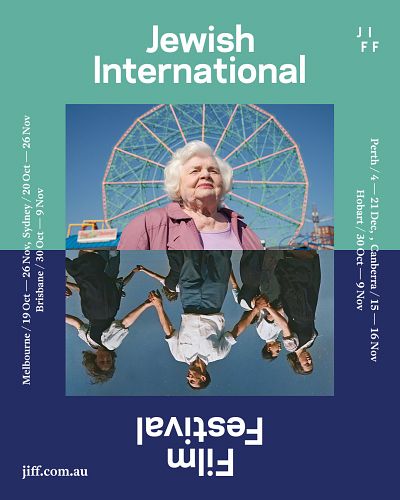
JIFF: The Property
Click here if you liked this article 4 ![]()
https://www.jiff.com.au/films/the-property
Date Reviewed: 22/10/2025
At a time of heightened anti-Jewish tensions and renewed debates over land, belonging, and displacement, The Property feels both deeply personal and painfully universal. For those who have experienced dispossession, a property is never just a piece of real estate; it is a vessel of memory, love, and loss, a place called belonging.
Directed by Dana Modan and co-written with her sister, acclaimed graphic novelist Rutu Modan, the film is based on Rutu’s Eisner Award-winning 2013 graphic novel. Though rooted in the Modan sisters’ own family story, it speaks to the shared pain of people across the world who have been forced from their homes, only to return and find their histories overwritten by others.
The film, however, is a missed opportunity to fully capture that universal ache; the kind felt by Jews who lost their homes during the Holocaust, Greeks expelled from Asia Minor during the genocide, Cypriots still barred from their villages in the island’s occupied north, Armenians scattered across the diaspora, and Palestinians navigating life in exile. In an era when entire populations are displaced by war, politics, or climate catastrophe, The Property could have been a searing meditation on the world’s oldest struggle: the fight for home.
Viewed against today’s political backdrop, the film resonates in unexpected ways. Its irony is sharp, a film about Jews reclaiming lost homes arrives at a moment when property, displacement, and return dominate the discourse around Israel and Palestine. The parallels are uncomfortable, but perhaps intentionally so. The film quietly asks whether any community can claim moral clarity when history itself unfolds in cycles of exile and return.
Instead, what we are given is a charming, intimate story that never quite plunges into the deeper waters it hints at. Yet there is a quiet power in its simplicity; a layered reflection on memory and identity, disguised as a grandmother–granddaughter tale.
Eighty-three-year-old Regina Segal (played with extraordinary nuance by veteran Israeli actress Rivka Michaeli) travels to Poland with her granddaughter Mika (Sharon Strimban) under the pretext of reclaiming family assets. But Regina’s true purpose soon surfaces: to find her long-lost love, Roman (Andrzej Seweryn), a Christian man, whose baby she was carrying but was forbidden to marry before World War II.
When they finally meet again, the balance between humour and heartbreak is exquisitely handled. Michaeli’s performance anchors the film, shifting effortlessly between wit and sorrow, comedy and drama, she brings fire to every scene. From the moment she enters the modest, decaying Hotel Kona and locks herself in her room to her lingering gaze on Roman for the first time, conveying the weight of 70 years of loss and silence.
The film opens with a poetic, dreamlike tableau, echoing Monet’s gardens, before giving way to the urban tones of Warsaw. Cinematographer Yaron Scharf captures the city’s melancholy beauty: streets steeped in history, apartments that seem to breathe with unspoken stories. Amid this greyness, Mika’s flirtations with a Polish tour guide (Piotr Pacek) add youthful colour and emotional contrast to Regina and Roman’s relationships rekindled after 70 years.
Yet The Property is not without flaws. Despite its sweet melancholy, the script leaves several questions unresolved. For instance, why are Jewish characters celebrating a Catholic holiday (Zaduszki)? Roman also shows so little curiosity about what happened to Regina's pregnancy. More crucially, the film never fully explores the symbolic weight of the “property” itself.
Perhaps that restraint is deliberate. The Modan sisters, descendants of Polish Jews who fled during the war, suggest in this work, that the act of return can never be complete. Some doors remain closed, some losses unrecoverable. Sometimes there is no true homecoming, only the quiet orbit around what once was. The resolution (spoiler alert) is to leave history be.
Despite its imperfections, The Property is a thoughtful film with a resonant message: ownership is not merely about land deeds or titles, but about the inheritance of memory, of guilt, silence, love, and identity.
And perhaps that is the Modan sisters’ most profound point: the only property we can ever truly reclaim is the story itself.
Highlights
- Directed by Dana Modan, co-written with Rutu Modan, based on her acclaimed graphic novel.
- Rivka Michaeli's performance is a standout: layered, funny, and heartbreakingly human.
- Beautifully shot by Yaron Scharf, balancing painterly visuals with Warsaw’s muted realism.
- A meditation on displacement, identity, and intergenerational memory.
- Timely and provocative in today’s climate of global migration and conflict.
- Explores the tension between personal loss and collective history.
Who it’s for
- Viewers drawn to arthouse and festival cinema.
- Those interested in Jewish history, memory, and diaspora narratives.
- Audiences who appreciate subtle, character-driven storytelling.
- Anyone reflecting on home, belonging, and intergenerational trauma.
‘The Property’ is one of 50 Jewish-themed films from around the world, screening as part of the Jewish International Film Festival in Australian cinemas nationally from 19th October through to 21st December.
Reviewed by Mary Sinanidis